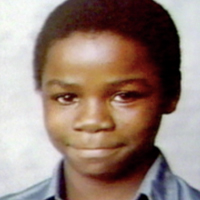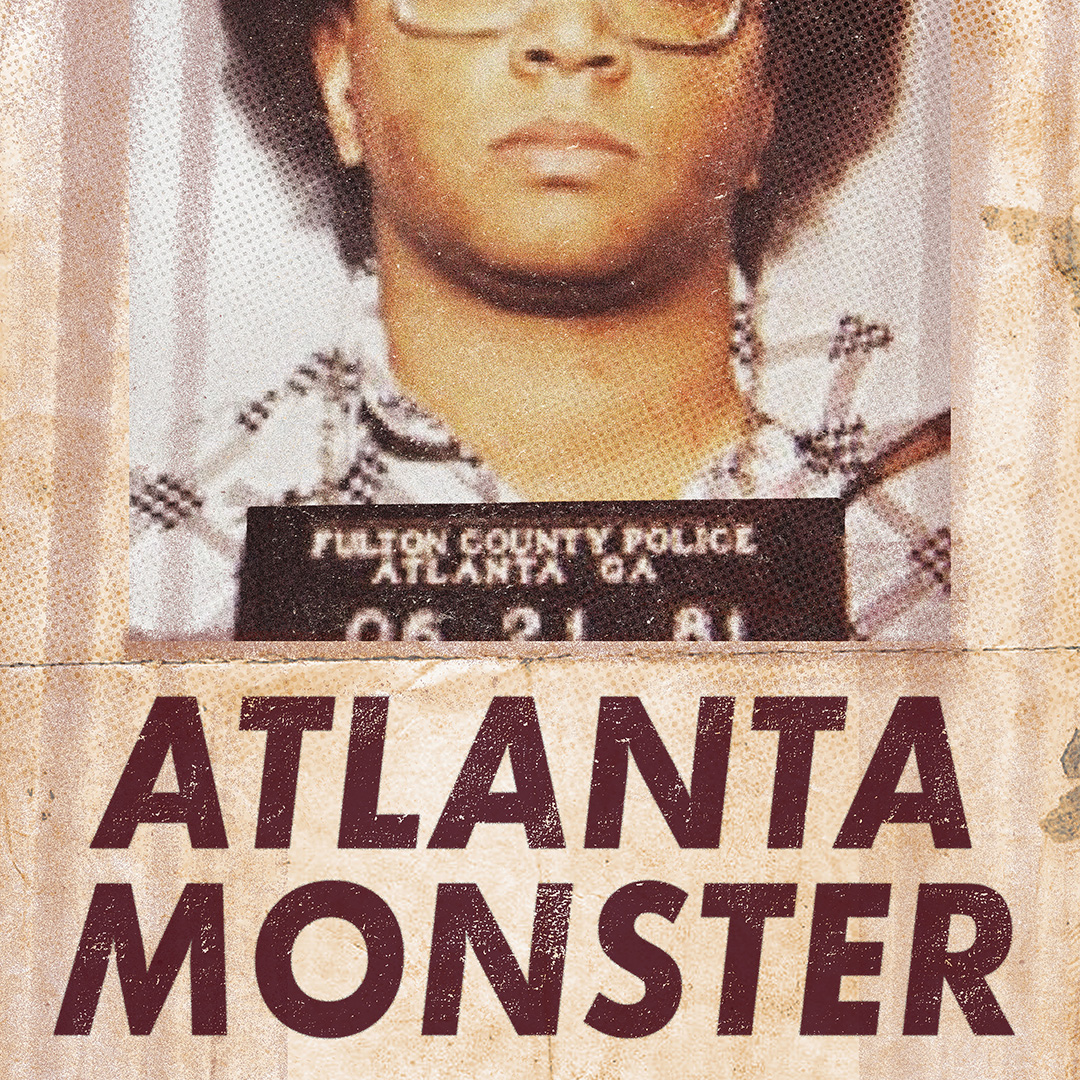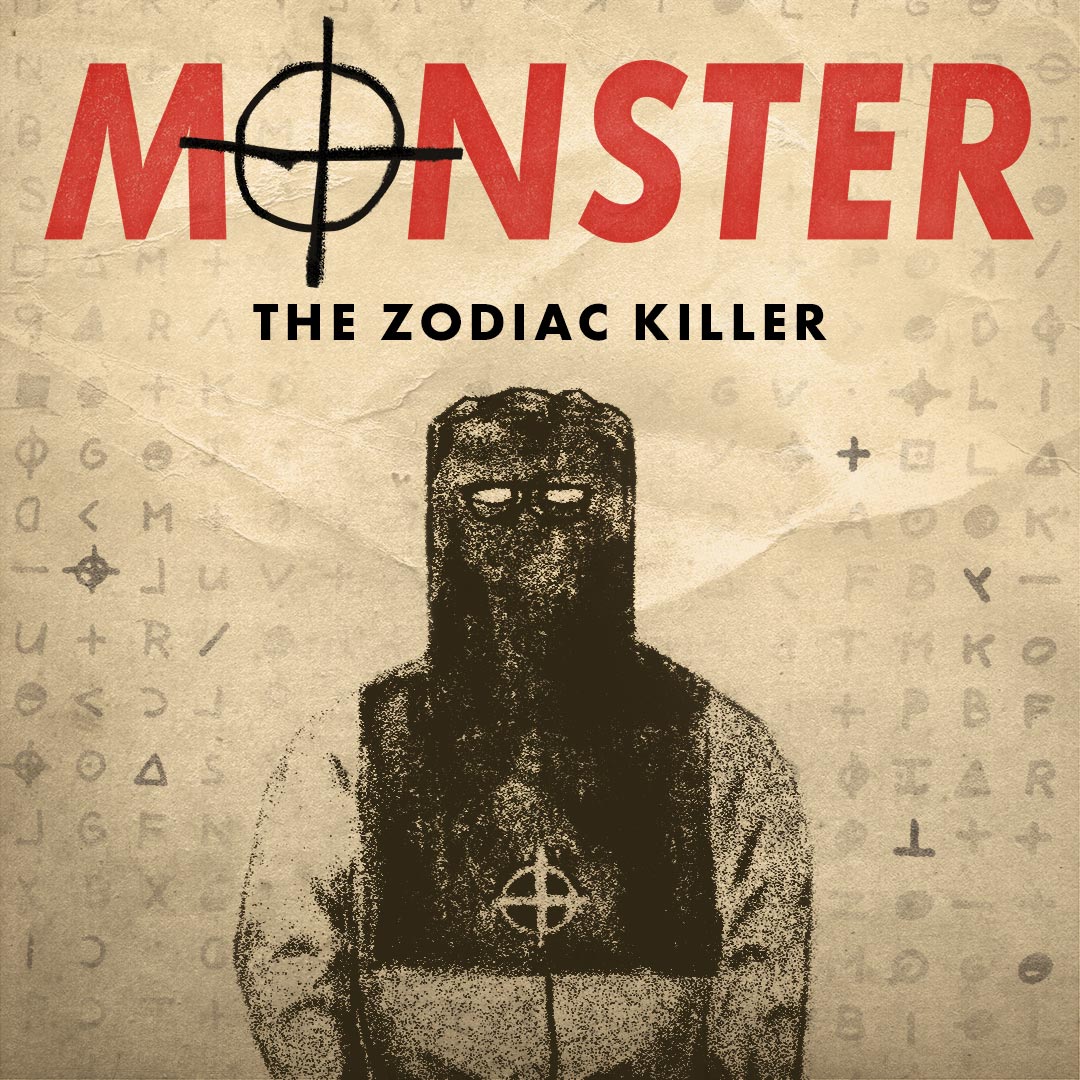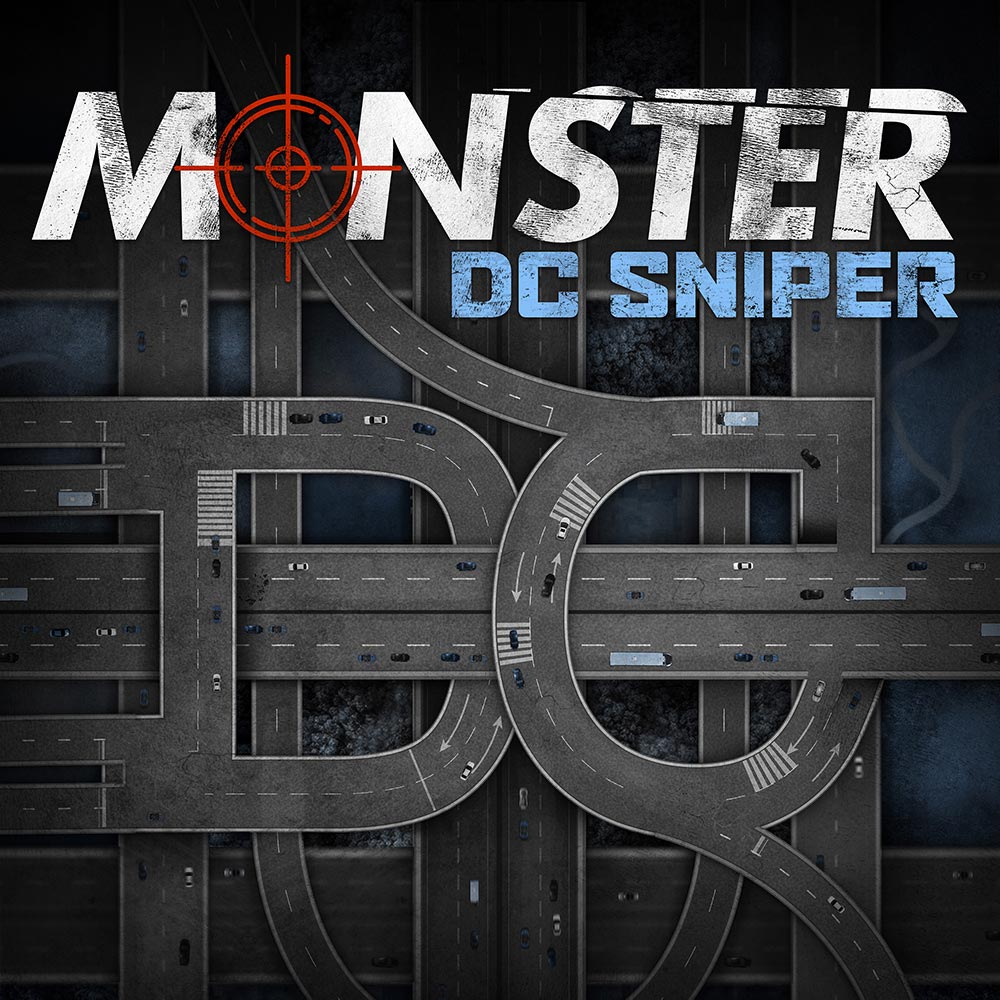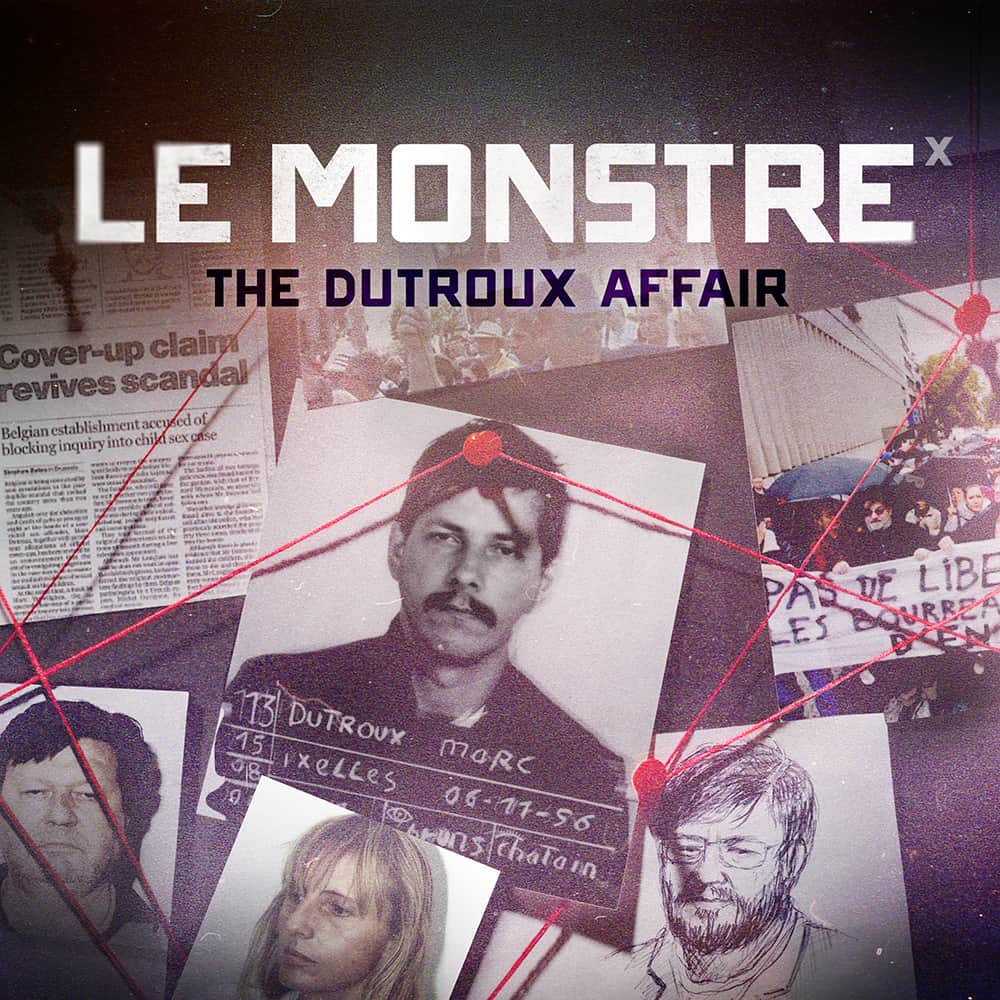Episode 7
Conspiracy?
Payne explores theories of Klan involvement within the case.
– Calinda Lee, historian
I’ve recently been told that if I release this podcast, “bad things” are going to happen to me in the sense of a threat on my life, or my safety, or that of my family.
– Neil Strauss, Journalist/Host
I’ve recently been told that if I release this podcast, “bad things” are going to happen to me in the sense of a threat on my life, or my safety, or that of my family.
– Neil Strauss, Journalist/Host
–
Victims
Lubie Geter
Age 14
Last Seen 01/03/1981
Transcript
Automated voice: This call is subject to monitoring, recording and identification of the location of the person being called. To accept charges, press one. Thank you for using Securus. You may start the conversation now.
Wayne Williams: One of my attorneys, Lynn Whatley, received a package on his door step, it was an anonymous package. He opened the package and found out that it contained hundreds of GBI files about a classified investigation that the agency had been doing into white supremacy involvement in the Atlanta killings. It also contained, I was surprised, several tape recorded confessions. Some of the Klansmen admitted that they were involved in the murder of some of the missing and murder cases.
Intro: In Atlanta, another body was discovered today, the 23rd. At police task force headquarters, there are 27 faces on the wall, 26 murdered, one missing.
Intro: We do not know the person or persons that are responsible, therefore, we do not have the motive.
continue reading
Payne Lindsey: From Tenderfoot TV and HowStuffWorks in Atlanta.
Intro: Like 11 other recent victims in Atlanta, Rogers apparently was asphyxiated.
Intro: Atlanta is unlikely to catch the killer unless he keeps on killing.
Payne Lindsey: This is Atlanta Monster.
News reporter 1: This was the first time Wayne Williams has been photographed since his trial almost two years ago. Jail officials say he has gained 40 pounds since he’s been behind bars, but he didn’t look heavier, just a little older. Sheriff Leroy Stynchcombe allowed him to hold this unusual news conference today because he says he thinks Williams deserves a chance to speak his piece before he is moved from the county jail into the state prison system, and, predictably, Williams began by denying he’s a child killer.
Wayne Williams: I have been wrongly accused and connected with a series of heinous crimes and all I ask is a chance to see justice.
News Reporter 1: Police officials have insisted that since Williams’ arrests, the murders of young Atlanta blacks have stopped, but Williams says he has evidence that at least 40 murders fitting the pattern of the child murders have been committed since he’s been in jail.
Vincent: Wayne tried to get his case reopened. If you look at it, if you go back in history, of course, a lot of this is archived. This is long before the internet, back in 1981 and ’82, but if you pull old records, I mean, there were people dying well after Wayne got convicted. For Wayne’s attorneys, that’s a good argument.
Wayne Williams: Since my arrest, summer 1981, the decomposed body of a young teenage black female found strangled on I-20. Summer of 1981, 15 year old black male found shot on West Lake Avenue in front of home, no further information. Summer of 1981, the 21 year old uncle of murder victim Curtis Walker was found dead, no further information. As you can see, there are definitely homicides that need to be investigated and all we’re saying is that we want the chance to get in court and deal with this information.
News Reporter 1: Jail officials say there have been threats on Williams’ life almost daily since he’s been behind bars. He will probably be moved into the state prison system sometime in January, but Sheriff Stinchcomb warns if he is put into the general prison population, he won’t last a day, but Williams says he’s not afraid.
Wayne Williams: I have some reservations about it because it will be a change, as he said, of address, but no, I don’t fear for my life. I just put my faith in god and trust.
News Reporter 1: Williams’ attorneys have just two more days to ask the state Supreme Court to reconsider its decision to uphold his two murder convictions. If the Court denies that request, as expected, Williams says he’s prepared to appeal his case all the way to the U.S. Supreme Court if necessary. Although today’s news conference was greatly anticipated, there were certainly no surprises. Instead, Williams continued to play off the long standing public doubts that the wrong man may be in jail, but once his case is kicked up into the federal courts, the only thing that matters are very complicated legal issues and public doubts, no matter how strong, probably won’t do anything to set him free.
News Reporter 1: That may be right, especially after all these years, but public doubt has persisted. Tyrone Brooks, Civil Rights advocate and acquaintance of Wayne Williams, started his own petition to reopen the Atlanta child murder cases.
News Reporter 2: Representative Tyrone Brooks says he is now demanding that all 28 murder cases blamed on Wayne Williams be reopened, Brooks claiming several police task force investigators have long doubted Wayne Williams’ involvement.
Tyrone Brooks: They pretty much were dissatisfied with the way things were going. They did not believe that Wayne Williams was the right suspect. They didn’t believe that the investigators were really on the right track, and really that the pressure was coming from Washington, from the Vice President’s office, down to Governor Busbee, through the GBI, through the District Attorney and on down to the Atlanta Police Bureau.
News Reporter 3: Pressure to do what?
Tyrone Brooks: Pressure to find somebody, to find a scapegoat.
Vincent Hill: I mean, you had George Bush coming in and saying we need these murders solved. The first black mayor of Atlanta, he was under a lot of pressure to get these solved. There were black kids dying in the city of Atlanta. That’s not a good look for the first black mayor. You had a lot of pressure from Washington to get this solved, so, I mean, it looks like that’s what happened, because you can’t go from, “We don’t have enough evidence to prosecute,” to, “Oh my god, we have all of these patterns and Wayne is our guy.”
News Reporter 2: Brooks alluding to a secret June 19, 1981 midnight meeting at the Georgia governor’s mansion, a meeting in which Fulton District Attorney, Lewis Slaton, was reportedly pressured by former Governor Busbee to arrest Wayne Williams, despite Slaton’s reluctance to do so at the time. Two days later, on June 21st, Slaton did move against Williams, arresting him at his house.
Payne Lindsey: If the arrest was backed by pressure from higher authorities, what else was in those case files that didn’t get enough attention.
News Reporter 4: One box, more than 6,200 documents, 20 homicide files, containing information never before revealed publicly on one of the most explosive criminal cases in the nation’s history. The files don’t paint a pretty picture. Instead, they sometimes paint the troubled cityscape where some of the victims came from. One file explores possible ties between a group of homosexuals and three victims. The files reveal that at some points during the investigation, suspects in at least two of the killings had included close relatives. There are mentions of drugs. Persons with criminal records surface often. One victim’s mother allegedly admitted to investigators she was a prostitute, but most of that had little to do with the end of the investigation. That came with the conviction of Wayne Williams in two of the cases.
Vincent Hill: Oh my god, it was everything but Wayne Williams. I mean, there were so many other suspects, and Wayne was not one of them, at all.
Wayne Williams: The newest defense rests and revolves around the murder case of Lubie Geter, and the supposed involvement of some unnamed members of the Ku Klux Klan. The new appeal, resting as it does, on the Lubie Geter case and the Klan involvement may be too fragile.
Vincent Hill: There was always speculation, even before Wayne got arrested, about some Klan involvement.
Wayne Williams: I do believe that there’s an element of the Ku Klux Klan embedded in the law enforcement community, and still is today. I do believe that wiping out young black men was a part of the overall agenda to weaken the black community.
Vincent Hill: The KKK, when you were a kid, that’s what we talked about, because it was strange for me. When we were in middle school, they still burned crosses on Stone Mountain, that was the rallying point for the KKK. It was always the things that you heard.
Calinda Lee: There were a lot of theories that people developed, that because they were all black, because they were mostly male, this was a KKK conspiracy.
Calinda Lee: Some people in the black community thought it was the Ku Klux Klan that was grabbing these black boys. The whole theory around it being the Klan came up because people in the black community did not believe a black person would do that to another black person, particularly a black child.
Payne Lindsey: How do you feel about the people who think that the Klan is involved in the Atlanta child murders?
Jim Procopio: That was a joke. That was an absolute joke. The Klan, number one, is not smart enough to commit 25 perfect crimes. Number two, if they did do it, they would have taken an ad out in the newspaper, they were toothless. Again, the Bureau insisted on keeping watch on them, so we just had informants go out to their meetings, make sure nobody was going to do anything crazy. The Klan’s just not smart enough. They’re a bunch of rednecks who hate blacks. They weren’t bright enough to commit this crime, and if they did, they would have taken out an ad in the paper. Plus, how do you go into a black neighborhood dressed in the hood?
Vincent Hill: The Klan wanted to take credit for it, they’re racist. It would have been a feather in their hat, if, as a group, they could have said, “Yeah, we killed 28 kids and got by with it,” but they couldn’t find anybody that would say, “Yes, I did it,” and they didn’t know enough of the facts to convince anybody that they did it. There was a guy named Charles Sanders, who was known to be a Klan member, I think his brother or uncle was pretty high up in the Klan at that time. There was speculation, there was talks that he was the one that actually killed Lubie Geter.
News Reporter 5: For years, selling things on streets and in shopping centers has been a prime way for children to earn extra money. 14 year old Chuck Geter was no exception.
Jim Procopio: We didn’t see any pattern, we didn’t see anything, and then January 23rd, after we came back, Lubie Geter happened.
News Reporter 5: On January 3rd, he went to the Stewart Lakewood Mall in southeast Atlanta to sell cans of Zep Gel, a car deodorizer.
Jim Procopio: Lubie Geter was 15 years old, he was selling Zep products at an outdoor mall down in southwest Atlanta. One Saturday afternoon, he disappeared. They organized a search on the 9th of January, and I remember, it was a cold, rainy Friday. They told us, APD told us, they gave us various areas in the city, areas they thought that a body might be dumped.
News Reporter 5: Investigators were literally beating the bushes, looking for any trace of 14 year old Chuck Geter. Trained dogs sniffed the area around the mall today, but turned up nothing. This weekend, volunteer searchers will be on the lookout for Geter, but police say so far, they’re stumped.
News Reporter 6: The roll call was impressive. Officers from the SWAT team, the task force, the motorcycle squad were here, so were recruits who have yet seen much action. Even agents from both the federal and Georgia bureaus of investigation were helping out. This was the first ever massive search conducted by the Atlanta police bureau. The more than 200 officers would look for anything that could help find 14 year old Lubie Geter.
Mike McComas: My partner and I were walking up and down the sides of that road, trying to see if we could find any evidence, with no hope of finding anything, and I looked down in the creek and I said, “There’s a pair of jeans.” The creek was overflowing its banks. He held my arms while I leaned over into that creek, found those jeans and Lubie’s school schedules in the back pocket of the pants. We put the pants and the belt, and one of the females in the family, I remember, she identified the belt as being his, because he was in such a state of deterioration, that identifying was kind of hard. I remember driving out there. The agent that had this case assigned was Frank Pickens, heck of a guy, he’s still around, hell of a man. He came out of that woods with tears in his eyes, he was crying. Lubie Geter just broke my heart, outstanding kid, I mean, just a phenomenal kid.
News Reporter 7: Vandiver Road was so blocked off this morning, only a few people could venture near the site where Geter’s body was found. Dozens of Atlanta police and FBI agents gathered at the site. The discovery of Geter’s body here now lends wake to the theory that one person could be responsible for several of the murders. The way Geter died, by strangulation, fits into a pattern. Three of Atlanta’s other murdered children died the same way. Two others died by suffocation. His discovery yesterday fits into another pattern, location. Within the last year and a half, six children, black males between the ages of 7 and 15 have all been found within a five mile radius.
Vincent Hill: Either the pattern doesn’t exist, there is no pattern, or we’ve got a much bigger problem. There was an independent witness that said, “This guy Charles Sanders said he killed Lubie Geter.” What is your evidence to say Wayne killed Lubie Geter? They have none.
News Reporter 8: Wayne Williams is being represented in this hearing for a new trial by his former attorney, Lynn Whatley, and two of this country’s most prominent attorneys, Bobby Lee Cook of Summerville, Georgia, and William Kunstler of New York.
Wayne Williams: We were in habeas corpus court in Butts County.
News Reporter 8: The defense is trying to show that the police were investigating that the Ku Klux Klan may have been responsible for some of the child murders, but that file was never turned over to help with Williams’ defense.
Wayne Williams: Apparently, what we found out after we got in the habeas corpus court, and a deep source within the GBI, was that they had a confidential informant, I believe his name was Whitaker.
News Reporter 8: The first witness today, Billy Joe Whitaker, says he worked as a police informant during the missing and murdered investigation. Whitaker says he told police detectives that a Klansman from Mountain View, Charles Sanders, told Whitaker he killed one of the child victims, Lubie Geter.
Wayne Williams: We were able to contact Whitaker and he did appear in court and testified under oath for us stating that one of the families, I believe they were in Mountain View, probably Sanders’ family, was indeed responsible for that.
Billy Joe Whitaker: I told them that I believe Charles Sanders of the Ku Klux Klan killed at least one of the kids named Geter.
News Reporter 8: Bobby Lee Cook and William Kunstler say they have a letter from Atlanta police major Herman Griner that called Sanders, the Klansman, the prime suspect in the murders four months before Wayne Williams was arrested and charged with two of the murders.
Payne Lindsey: In 1991, Wayne’s attorneys called for a court hearing, where police informant Billy Joe Whitaker testified for Wayne Williams. This man, Billy Joe Whitaker, was in jail during the early 80s, but when he heard that Lubie Geter had become one of the victims, he contacted the Georgia Bureau of Investigation. Whitaker stated that a man named Charles Sanders made threats against Lubie Geter’s life. Whitaker claimed he wore recording equipment, went to Sanders’ home and got him to admit to the child’s murder. If that was true, then Wayne Williams was not responsible for Lubie Geter’s death.
Vincent Hill: It definitely makes you question, okay, first, not enough evidence to convict Wayne, now there’s these tapes from this Klansmember, which is mind boggling.
Wayne Williams: I’ve actually heard the wiretap recordings and all, and they talk about, openly and brazenly, about saying, “Yes, I killed the little black beep. He ain’t nothing but a blank blank blank.” We went to court trying to get this in to evidence, but the court of Butts County blocked us from using it, and they put the tape recordings under seal in Judge Craig’s court. We attempted to bring this up in federal habeas corpus court, and that was where the issues starting the appeal. We’ve been trying for decades to get this information out, because the GPI did not want it out, because they issued, in one of the documents, a statement saying that they were afraid that public release of this information would start a race war in Atlanta.
News Reporter 8: Assistant Fulton County District Attorney Joe Drolet prosecuted Wayne Williams. He says he was never told about the Klan file. Do you think you should have known about it?
Joseph Drolet: Not particularly, it wasn’t relevant at the time.
Vincent Hill: The GBI had it, the police department had it, two prosecutors had it, two judges had it, if Lewis Slaton didn’t have it, it means he didn’t want it.
Payne Lindsey: After Whitaker testified, Williams was still not granted a retrial. The strangest part is that, now, the tapes were nowhere to be found.
Wayne Williams: This is information that the GPI had, and, like I said, they kept it suppressed, because they were too busy worried about a racial war instead of trying to solve the killings in Atlanta.
Vincent Hill: You didn’t want a race war in 1981 or ’82, you just didn’t. We weren’t that far removed from the civil rights. You had your first black mayor. You had all of these elected officials, because of the mayor, that were black, so it wouldn’t have looked good for the city at all. I liken it to Rodney King, when those officers got off, look what happened in that city. I liken it to OJ Simpson. Say what you want, I believe the evidence shows that OJ killed Ron and Nicole, but there was talks in the city, “If he’s convicted, there’s going to be riots. It’s going to be a whole racial thing.” If you look at that case, that was right down the middle, black and white. You know, had OJ been convicted, we would have saw another 1992 Rodney King. I think that would have happened here in Atlanta back in 1981, ’82, if it would have been Klansmen, there’s no doubt in my mind.
Wayne Williams: We aren’t saying that the white suspects in the Klan is responsible for all of them, but we know that they were responsible for this particular killing here. We have a confidential informant that was brought to our attention, we have a GBI source, I can’t reveal his name, an agent that left a box on the mayor’s doorstep. It had several reel to reel tape recordings of wiretaps and several documents on that file. During the wiretap, Sanders admitted to killing Lubie Geter and had been involved in several of the other cases, we’ve got that on wiretap.
Vincent Hill: When you have a name like Charles Sanders, and you have a witness who knew Charles saying that, “Yes, Charles is the one that said he killed Lubie Geter way back when,” there were secret recordings. There was an incident, supposedly around the Starwood Theater, where Lubie Geter hit his car with a shopping cart, or a go-kart.
Wayne Williams: Clearly, there was a go-kart incident in which he collided with Sanders’ car, according to the information we have, and that Sanders had made a threat against him that he would kill him, and he reiterates the threat in the wiretap that we heard. I’m paraphrasing to the best of my memory, he said, basically, “Yeah, I killed a little black beep. I blank blank blanked him,” and then he said, “Yeah, but it gets more.”
Vincent Hill: He had made the comment he was going to kill that little black kid for hitting his car, and he was going to strangle him to death, and of course, that’s how Lubie Geter was killed.
Payne Lindsey: In 1986, Spin Magazine published an article titled, “A Question of Justice.” The article’s authors, Barry Michael Cooper and Robert Keating, raised doubt about Wayne Williams’ guilt, and brought the idea of the KKK involvement to mainstream news. It was a hugely popular article. Really, it was the first time the Atlanta child murders’ KKK theory was given any legitimate credence by the media.
Vincent Hill: -From a publication, so of course, people can argue that it was slanted, you know, argue that it’s fake news, that’s the new term nowadays, but what’s interesting is, not only is it in the Spin article, but the FBI talks about these recordings. I don’t think the tapes were made up. I definitely don’t think the transcripts were made up.
Payne Lindsey: I asked Vincent what Charles Sanders said in those transcripts that alluded to him being the Atlanta child murderer, killing more than one person.
Vincent Hill: In one of those conversations, there was talk, and I believe it came from Charles Sanders, that he was going to go out and drive around and look for another black kid, another victim.
Payne Lindsey: If this was true, then why wasn’t this a bigger deal? From all the records I’ve seen, that’s the closest to a confession that law enforcement ever had.
Vincent Hill: Time affects any investigation, or any case, because memories get skewed, and a lot of stuff gets lost or destroyed. A lot of people along the way pass away, like Charles Sanders is no longer here, so we could never go back and question him. Here we are, 30+ years removed, and time actually allows any false narrative to become true, if that makes sense. “Oh yeah, there were a bunch of kids that died, and this guy did it.” That scenario, pretty much everyone knows that scenario, but they don’t know the ins and outs of, “Well, this person could have been a suspect, this person, this person, this person,” you know, they just know Wayne Williams. They were deep into a lot of people, they were deep into the guy in the blue Nova, they were deep into Sanders, they were deep into the Klan, they could have known that they were plotting something that the public wasn’t privy to. You look at some of these terror groups that are investigated now, that you hear about later, the FBI says, “Oh, we halted a terror threat, because we were investigating this person,” which no one heard about.
Payne Lindsey: Besides Charles Sanders, who admitted to killing Lubie Geter.
News Reporter 9: What started as a joke 100 years ago, when a group of men donned bedsheets for a romp, has over the years attracted to it persons charged with acts of harassment, intimidation and violence throughout the south. Even though the nation has been outraged for many years, the Ku Klux Klan persists with its bizarre ritual and trappings, but 100 years is a long time for a joke.
Payne Lindsey: I talked to Felix Harcourt, author of the book, “Ku Klux Kulture,” for some more historical background on the KKK.
Felix Harcourt: The Ku Klux Klan effectively operates as a white supremacist terrorist organization, founded after the Civil War during what we commonly refer to as the Reconstruction period. It’s founded in Pulaski, Tennessee, and it’s not super popular to start with. It lies fairly fallow through the first World War. If you’re looking at the Reconstruction Klan, they stand for white supremacy and the maintenance of white power. If you look at the civil rights era, they largely are standing for the same thing. If you’re looking at the 20s, they achieve this much, much larger success in the 20s, because they effectively diversify their hatreds. They say, “Hey, if you hate African Americans, we are there for you, but also if you hate Catholics, we are there for you. If you hate Jewish immigrants, we are there for you. If you hate immigrants of all kinds, we are there for you. If you’re worried about prohibition, we’re there for you.” By the time you get to the Klan of the late 70s, early 80s, the Klan is all in on immigration, and are staging stunts on the Mexican border. There’s this fundamental racist tenant, and then these variations over time as to what draws people to the Klan and what people see the Klan standing for.
Felix Harcourt: To some extent, the Klan of the 80s sets the model for what we see with white supremacists now, particularly through what David Duke does. David Duke really comes out in the late 70s, and tries to remake the public image of the Klan, to some extent. Effectively, what he tries to do is bureaucratize hate. It’s a methodology that we’re seeing being used to great effect by the alt-right now. David Duke is really astute at using the media to get this message out, saying that there is a new Klan, whatever that may mean, and in doing so, effectively spearheads a Klan revival in the late 70s, early 80s. This doesn’t exist in a vacuum, there is a big upsweep in white supremacism in the late 70s, early 80s, in the United States, so you do see a very active and very visible white supremacist movement on the march by the early 80s.
Felix Harcourt: I will say that, certainly, that is a period when we are seeing a rising in Klan activity, and it’s a period in which we are seeing an uptick in white supremacist activity more generally. All Klan members are white supremacists, not all white supremacists are Klan members. We have always seen significant white supremacist activity that fundamentally is not linked to the Klan as an organization. Most of the anti-civil rights violence is being carried out not by Klan members, but by average white supremacists, if that’s a term we can use. To some extent, that’s what we see today. The Klan as an organization is weak. It is defuse, still there is no single Klan, there are all these individual organizations battling for the title of who is the legitimate Klan, but they are part of a much broader tapestry of white supremacism that we can see operating very clearly, I think.
Felix Harcourt: White supremacists have always been ordinary people. That doesn’t mean that we should normalize them, it means that we should look at ourselves and say, “What is it that is giving cover to these people to exist within our society, and to exist very comfortably within that society?” Just because they are dapper, that word that kept getting tagged to Richard Spencer, doesn’t mean that they are not still subscribers to a hateful ideology of racism and white supremacism. The fact that the Klan is on the rise in the late 70s, early 80s, the fact that racial violence is on the rise, to the extent that congressional hearings are being held into anti-black violence at the time, and the fact that Atlanta holds this significant position within the history of the Klan, makes it understandable why someone would link these child murders to Klan members. It is an entirely reasonable assumption to believe that white supremacist violence is touching your community in this way.
Payne Lindsey: In the eyes of Vincent, it was nearly impossible that there were was only one killer involved. Of course, there is a pattern, but according to Vincent, it doesn’t match up in each and every case. Where was this Atlanta monster that everyone was so in fear of for two years?
Vincent Hill: There were several monsters. All of these victims, they had different suspects, other than Wayne Williams, other than Wayne Williams, so yeah, there were several monsters, but there wasn’t just one monster going around killing these kids. Is there a conspiracy going on here? You can’t not question that, you know?
Payne Lindsey: Is there a conspiracy at play here? The term conspiracy tends to immediately incite ridicule. Many people equate conspiracy with total fantasy, unbelievable stories to explain away historical events.
Ben Bowlin: A conspiracy theory and an actual conspiracy are two very different things nowadays.
Payne Lindsey: To gain some perspective, I talked to one of the guys from HowStuffWorks, who has his own podcast on this very topic.
Ben Bowlin: My name is Ben Bowlin, and along with my co-hosts, Matt Frederick and Noel Brown, I produce and host a podcast called, “Stuff They Don’t Want You to Know,” which applies critical thinking to what we would call conspiracy theories, so government cover ups, unsolved crimes, various allegations of that sort.
Payne Lindsey: Are you a conspiracy theorist?
Ben Bowlin: I would say I find them interesting, but the term gets problematic. Conspiracy, at its most basic level, is a situation where two or more people, or entities, work together to deceive, or manipulate, a third party.
Payne Lindsey: When I even hear the word conspiracy theory, I’m already tuning out. I wanted to talk to you about the origin of conspiracy theories to begin with. Obviously, there are some true ones, right? Where did this all come from?
Ben Bowlin: What tends to happen when people hear a phrase or a term, especially the phrase and the term conspiracy theory is, as you said, you kind of shut out the idea that, “Okay, anything that happens after I hear this phrase is going to be utter hogwash.” Interestingly enough, the reason that’s the case in the United States today is because shortly after the JFK assassination, most Americans did not believe the official government explanation. Intelligence agencies spread memos to newspapers, media outlets of the time, saying, “This is what happened. The Russian government is attempting to spread propaganda, so if you hear anything else, other than this official story, be sure to dismiss it and call it a quote, conspiracy theory.” We do know that certain things that were once considered conspiracy theories are true. It did turn out that banks were laundering money for international drug cartels. It turns out it is somewhat disingenuous to group that kind of phenomenon, along with CIA drug smuggling, in the same bucket as the idea that, what, the British royal family is a bunch of evil, half alien lizard people. Those are both called conspiracy theories, but they’re very different, and there’s one incredibly important difference, and that’s that the first stuff is true. The second stuff, I’m just going to go out on a limb and say is not true.
Payne Lindsey: I asked Ben to outline the most prevalent conspiracy theories for the Atlanta child murders case.
Ben Bowlin: One would be the idea that law enforcement did not have a clue who the real killer was, and they wanted to close the cases, so they pinned them, or they pinned many of these child murders, on Wayne Williams in court, just to get them off the books. Another would be the idea that there was some sort of clandestine sex trafficking ring at play, and that, again, law enforcement, for some reason or another, assisted in covering up this information and keeping it from the public. Then, the third idea would be that the KKK, or other white supremacist groups, were committing the murders, with either tacit assistance, or approval, by sympathetic law enforcement officers. A great deal of it does come from the conversations relayed by Sanders, and, in the excellent Spin article from the time, there’s some top notch journalistic investigation.
Ben Bowlin: They had one of the journalists who, I think, broke the first Spin story on crack cocaine, who was writing this, and exploring this angle, and they had an informant named BJ Jones, that they thought was a solid guy, who came to them and said that there was proof that the KKK, specifically, Sanders, and possibly not just this individual, but members of his family, or his close associates, were involved in these murders, with the goal of killing one black child a month, or something of that nature. There’s a further aspect here that we have to remember, and that’s the context, or the cultural ecosystem in which this occurs. Distrust of a largely white police force is already incredibly high. If there were a doomsday clock for race relations in Atlanta, it would be about three minutes to midnight.
Payne Lindsey: The only publication that pushed this out there was this Spin story. You can’t go find these original recordings, but these guys at Spin were able to get their hands on some transcripts. Besides that, there’s nothing out there that publicly exists that says Charles Sanders was a part of the Atlanta child murders.
Ben Bowlin: That’s one of the frightening, tantalizing and, I would say, frustrating things for anyone investigating this. We’re really in a situation where if we want to prove or disprove this sort of connection, we would need someone to go speak directly to a primary source.
Payne Lindsey: To get to the bottom of this theory, I would have to find someone who was close to Charles Sanders, still alive, and also willing to talk. It seemed pretty unlikely, but after weeks of searching, I got a strange email that led me to one of Sanders’ old friends.
Sanders’ Friend: I don’t want to tell anything, because my wife right now is real nervous. We’ve been through this before. My name was put out there, and it was a scary ordeal. Family spent a few weeks in a hotel, just out of being scared, and I don’t know you from Adam. It’s a story that I’ve held on to for a long time, that I’ve known about. I don’t know how you want to go about this thing.
Payne Lindsey: You can always come here to the office that we have at-
Sanders’ Friend: I’d rather not. I first met him back in 1980. We would hang out and sit around and shoot the shit and drink beers and smoke pot, after working hours and whatnot. Him and his brothers were in the KKK. When I met him up here in this sleepy little town I live in, he was not involved, he had gotten out. He was a nice guy, good old redneck, had a few teeth missing, had a beard and a small stature. You wouldn’t think, here in this little sleepy town, anything different, that he was any kind of a monster. He certainly didn’t act like it, until he drank. Then, he got the eyes of Charles Manson, that would look right through you. It was scary, it was real scary. It scared all of us, but it wasn’t that often. He stopped in one day with this copy of Spin Magazine. He had that look in his eyes. He obviously had been drinking some hard liquor. He said, ” I got something for y’all to take a look at,” and we didn’t have a clue what he was talking about. He pulled out the magazine and we started reading it. It was jaw dropping.
Sanders’ Friend: Somebody asked him if it’s real, if the article was true. He told us it was. He said it was true. He told us about certain situations that were, it was either the FBI or the ATF, would come in and raid their house in the middle of the night and shake them down. They would come in, and I remember him talking about them coming in all the time and trying to shake him down and try to find some kind of evidence. I remember Charles saying that he was lucky, because his carpet matched Wayne Williams’ carpet, as well as the white German shepherd hairs matched. He owned a white German shepherd. Wayne Williams also owned a white German shepherd.
Sanders’ Friend: It just so happens that the person, Wayne Williams, that they pinned all these murders on, had so many similarities with Sanders, as far as the dog and the carpet. Again, I haven’t read the Spin Magazine since the 80s, but I remember a situation Charles told us about. They were hanging outside his home, and there’s a black kid on a go-kart. He accidentally ran into their car. They didn’t appreciate that, they were pissed.
Payne Lindsey: Which kid did this?
Sanders’ Friend: Geter, I believe that’s his name. I remember him saying, “We got him. We took care of him.” He told me they got him, they got the boy for doing that. I don’t remember him ever saying the KKK was involved with this. I only remember him talking about him and his brothers being involved in this. I don’t know to what extent the brothers were involved. I do know they had a cache of weapons, because they were expecting a huge revolution to come out of this. He basically told us that he did it, everything in that Spin Magazine was true. I don’t know, I don’t really know why he decided to come out to us and tell us that. He trusted us, I guess, but it certainly blew us away. He really never went into any details of any of the other killings, besides the fact that there were other killings that him and his brothers did.
Payne Lindsey: What kind of victims were they?
Sanders’ Friend: They were black children. They were children, they weren’t adults, they were children. I don’t know what was on their mind, if they were going to commit genocide in Atlanta, and try to do away with the, you know, or if he was trying to cause a riot, a race riot of some sort. I know that’s why they had that cache of weapons, is because they expected some type of race riot.
Payne Lindsey: Who do you think is responsible for the Atlanta child murders?
Sanders’ Friend: I know who’s responsible for some of them. Wayne Williams may be responsible for some, as well. He let it be known that Spin Magazine was right on, that they took care of those boys. Everybody, then, was hoping it wasn’t a white guy, or the KKK, because they didn’t want a race riot to take place in Atlanta. I believe they geared their investigation towards Wayne Williams, and once they found out he had possibly killed some of the adults, it was easy pickings to throw all the other children on him, too.
Payne Lindsey: Did you ever consider going to the police with this information?
Sanders’ Friend: No, I was too scared. No, I wouldn’t have gone to the police back then.
Payne Lindsey: Can you tell me about why you were scared?
Sanders’ Friend: Scared for my life. At that time, I had a wife. I didn’t have a daughter then, but I had a wife. I saw that look in his eyes when he was crazy. I believe he could’ve done anything, anything. I did go, a guy by the name of Royal, black guy that used to do TV commentary in Atlanta, he did a gig on the missing and murdered children of Atlanta one time, and I called him and told him what I knew, and he knew, about the Sanders brothers, but my name was brought up, and that scared me. I never spoke to anybody after that. That was in 1994, so once I found out that my name had been brought up, we moved into a hotel for a couple weeks, to stay clear of anything. I believe not only was my name brought up, my town was brought up, that I live in.
Payne Lindsey: Who did you fear, in particular?
Sanders’ Friend: Sanders’ brothers, and I don’t know how many of them there are, there’s like four or five.
Payne Lindsey: You feared them?
Sanders’ Friend: I feared them. More than anything else, I feared them. For some reason, I’m thinking that these acts of murder were perpetrated by the Sanders brothers, not necessarily by the KKK. To my knowledge, there was no other members, there was no other people involved with the murders except the Sanders brothers, and them alone. I never heard him talking about the KKK necessarily being involved with the murders, it was always him and his brothers. Wrong has been done that needs to be righted, but I’m still eerie of anybody who was involved with Sanders. Obviously, I know what they can do. Once it was pinned on Wayne Williams, they were thrilled. That was their way out. It was being pinned on him, and that was their way out.
Payne Lindsey: What do you think should happen now?
Sanders’ Friend: I don’t know. I really don’t know. I don’t know. I don’t know where to go from here. I know that there was some wrongs that should probably be righted. Charles is dead, he’s gone, there’s families still suffering. There’s families that think Wayne Williams and there’s others that think he didn’t do it all. I can tell you, he didn’t do it all. I know who killed those kids. I’m sorry that I did not come forth sooner, but I felt my life was in danger, as well. Justice has not been served. If it had been my daughter, I would want the truth revealed. You can’t change the past, but at least it would answer questions. You had children that were brutally murdered for no reason, completely innocent children, and if, indeed, you think it was somebody other than Wayne Williams, you are most definitely correct. Anybody out there who thinks that Wayne Williams didn’t do all this by himself is correct. This wasn’t all him. I only know that from the mouth of the devil himself.
Payne Lindsey: Next time, on Atlanta Monster.
News Reporter 10: The Clayton County woman and her husband were driving on this narrow cemetery road, when they saw a green car coming straight at them at a high rate of speed.
Woman informant: The driver was tall, and he’s light colored, a light colored black man, and he had on a wig. I know it was a wig, because he was losing it, because there was a child in the front struggling, he was struggling with that child.
News Reporter 10: You’re sure you saw a child in the car struggling?
Woman informant: Yes, yes, I saw it, because it was just back and forth, like that, like he was trying to hang on to that child. It was a boy, between the ages of about 10 and 12, and he had a short haircut.
News reporter 10: You think you could identify these two men?
Woman informant: Yes, and the one with the wig had on glasses. I could identify them.
Payne Lindsey: The Atlanta child murders is one of the largest and most complex cases in US history. As a team, we’ve spent months digging through police records, court documents and media archives. Through all this research, we’ve uncovered stories you’ve never heard before, and next week, we’re going to dig deeper into some of these stories. Atlanta Monster is an investigative podcast told week by week, with new episodes every Friday, a joint production between HowStuffWorks and Tenderfoot TV. Original music is by Makeup and Vanity Set. Audio archives courtesy of WSB News, Film and Video Tape Collection, Brown Media Archives, University of Georgia Libraries. For the latest updates, please visit atlantamonster.com. One last thing, we’ve set up an Atlanta Monster tip line. Anyone with information, leads or personal accounts pertaining to the Atlanta child murders can call us and leave a message. The number is 1-833- 285-6667. Again, that’s 1-833-285-6667. Thanks for listening.
Ben Bowlin: Let’s bring it to a human level. Here in the United States, the first conspiracy that many people encounter occurs when they’re kids. It’s the story of Santa Claus. You can’t really blame people for being distrustful of authority after that. I mean, it’s a conspiracy that everyone participates in. I should have put a warning in there for parents.
Payne Lindsey: But Santa is real.
More Episodes
Episode 8
CIA
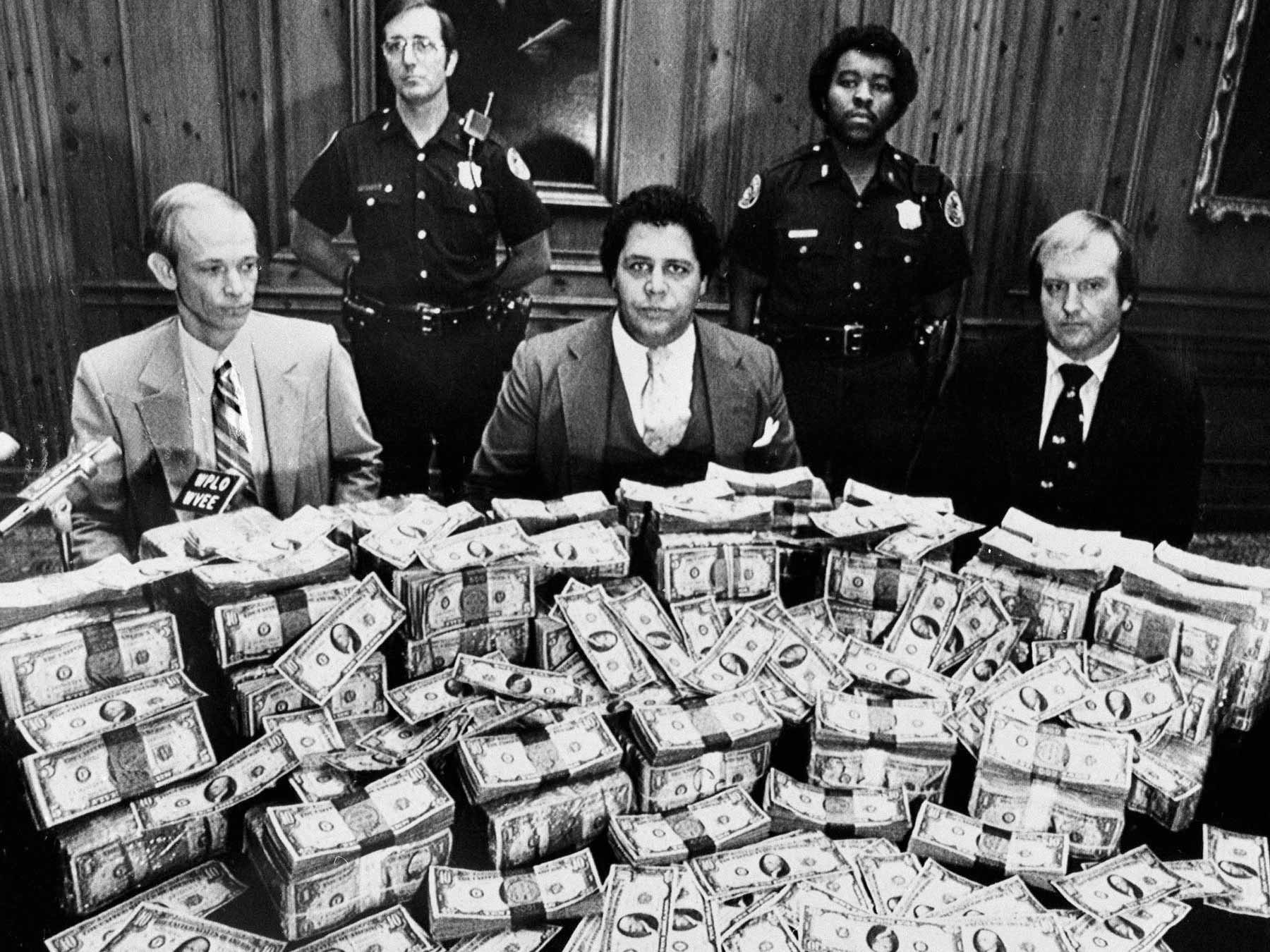
What car did Wayne really drive? Where did the reward money go? And was Wayne scouted by the CIA?
Episode 9
The Trial
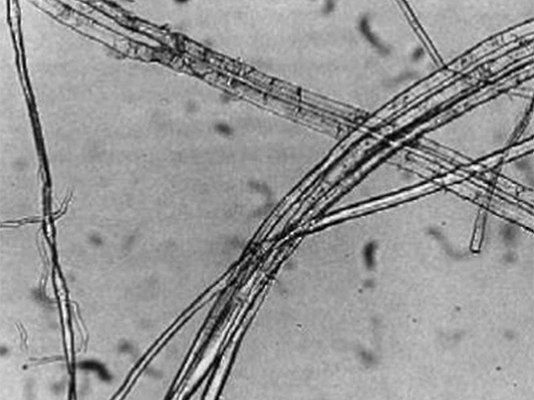
Trial by trace evidence.
Episode 10
Loose Ends
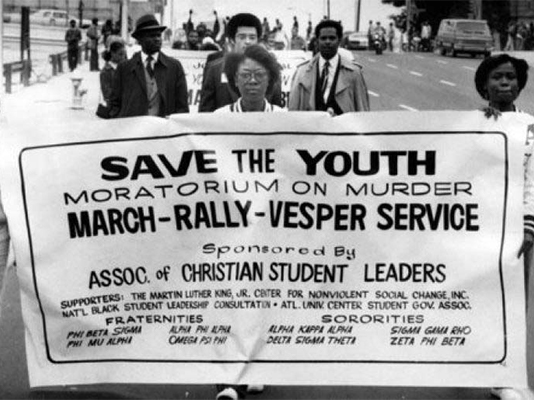
In this case, the truth depends on who you choose to believe.

